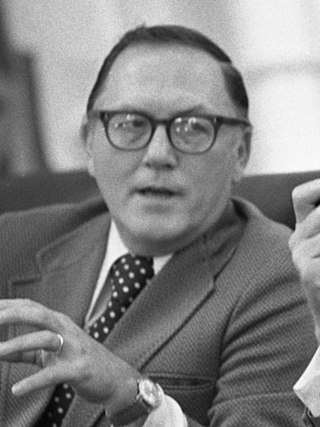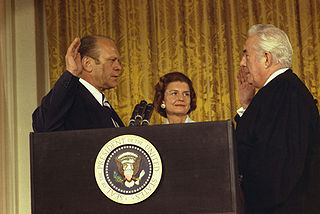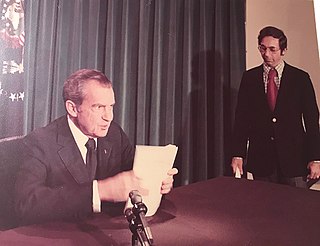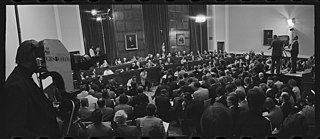
The Watergate scandal was a major political scandal in the United States involving the administration of President Richard Nixon from 1972 to 1974 that led to Nixon's resignation. The scandal stemmed from the Nixon administration's attempts to cover up its involvement in the June 17, 1972, break-in of the Democratic National Committee headquarters in Washington, D.C., at the Watergate Office Building.
A motion or vote of no confidence is a formal expression by a deliberative body as to whether an officeholder is deemed fit to continue to occupy their office. The no-confidence vote is a defining feature of parliamentary democracy which allows the elected parliament to either affirm their support or force the ouster of the cabinet. Systems differ in whether such a motion may be directed against the prime minister only or against individual cabinet ministers.

United States v. Nixon, 418 U.S. 683 (1974), was a landmark decision of the Supreme Court of the United States in which the Court unanimously ordered President Richard Nixon to deliver tape recordings and other subpoenaed materials related to the Watergate scandal to a federal district court. Decided on July 24, 1974, the ruling was important to the late stages of the Watergate scandal, amidst an ongoing process to impeach Richard Nixon. United States v. Nixon is considered a crucial precedent limiting the power of any U.S. president to claim executive privilege.

The Saturday Night Massacre was a series of events that took place in the United States on the evening of Saturday, October 20, 1973, during the Watergate scandal. US President Richard Nixon ordered Attorney General Elliot Richardson to fire Special Prosecutor Archibald Cox; Richardson refused and resigned effective immediately. Nixon then ordered Deputy Attorney General William Ruckelshaus to fire Cox; Ruckelshaus refused, and also resigned. Nixon then ordered the third-most-senior official at the Justice Department, Solicitor General Robert Bork, to fire Cox. Bork carried out the dismissal as Nixon asked. Bork stated that he intended to resign afterward, but was persuaded by Richardson and Ruckelshaus to stay on for the good of the Justice Department.

Ronald Louis Ziegler was the 13th White House Press Secretary, serving during President Richard Nixon's administration.

The prime minister of the Republic of Korea is the deputy head of government and the second highest political office of South Korea who is appointed by the President of the Republic of Korea, with the National Assembly's approval. The prime minister may be a member of the National Assembly, but this is not required to hold the office. The prime minister of South Korea is not the head of government of South Korea, for the President is both the head of state and government in the country.

Robert Paul Griffin was an American politician. A member of the Republican Party, he represented Michigan in the United States House of Representatives and United States Senate and was a Justice of the Michigan Supreme Court. He co-sponsored the Landrum-Griffin Act, which regulates the internal affairs of labor unions. As a deputy minority leader in the Senate, he called on President Richard Nixon, a fellow Republican, to resign during the Watergate scandal.

Bill Clinton, the 42nd president of the United States, was impeached by the United States House of Representatives of the 105th United States Congress on December 19, 1998, for "high crimes and misdemeanors". The House adopted two articles of impeachment against Clinton, with the specific charges against Clinton being lying under oath and obstruction of justice. Two other articles had been considered but were rejected by the House vote.

The Second EDSA Revolution, also known as the Second People Power Revolution, EDSA 2001, or EDSA II, was a political protest from January 17–20, 2001 which peacefully overthrew the government of Joseph Estrada, the thirteenth president of the Philippines. Following allegations of corruption against Estrada and his subsequent investigation by Congress, impeachment proceedings against the president were opened on January 16. The decision by several senators not to examine a letter which would purportedly prove Estrada's guilt sparked large protests at the EDSA Shrine in Metro Manila, and calls for Estrada's resignation intensified in the following days, with the Armed Forces withdrawing their support for the president on January 19. On January 20 Estrada resigned and fled Malacañang Palace with his family. He was succeeded by Vice President Gloria Macapagal Arroyo, who had been sworn into the presidency by Chief Justice Hilario Davide Jr. several hours earlier.
Audio recordings of conversations between U.S. President Richard Nixon and Nixon administration officials, Nixon family members, and White House staff surfaced during the Watergate scandal in 1973 and 1974, leading to Nixon's resignation.
Ma. Merceditas Consunji Navarro Gutierrez is a Filipino government official who is currently serving as member of the board of trustees of Government Service Insurance System (GSIS). After graduating from the Ateneo de Manila University Law School in 1973, she quickly established herself as a valuable government figure. Aside from becoming a two-time Justice Secretary of the Philippine Justice Department, Gutierrez also became the first woman to head the post of Ombudsman. She assumed the position on December 1, 2005, and resigned from office on May 6, 2011.
In parliamentary procedure, requests and inquiries are motions used by members of a deliberative assembly to obtain information or to do or have something done that requires permission of the assembly. Except for a request to be excused from a duty, these requests and inquiries are not debatable nor amendable.

The inauguration of Gerald Ford as the 38th president of the United States was held on Friday, August 9, 1974, in the East Room of the White House in Washington, D.C., after President Richard Nixon resigned due to the Watergate scandal. The inauguration – the last non-scheduled, extraordinary inauguration to take place in the 20th century – marked the commencement of Gerald Ford's only term as president. Chief Justice Warren E. Burger administered the oath of office. The Bible upon which Ford recited the oath was held by his wife, Betty Ford, open to Proverbs 3:5–6. Ford was the ninth vice president to succeed to the presidency intra-term, and he remains the most recent to do so, as of 2023.
A president is a leader of an organization, company, community, club, trade union, university or other group. The relationship between a president and a chief executive officer varies, depending on the structure of the specific organization. In a similar vein to a chief operating officer, the title of corporate president as a separate position is also loosely defined; the president is usually the legally recognized highest rank of corporate officer, ranking above the various vice presidents, but on its own generally considered subordinate, in practice, to the CEO. The powers of a president vary widely across organizations and such powers come from specific authorization in the bylaws like Robert's Rules of Order.

President Richard Nixon made an address to the American public from the Oval Office on August 8, 1974, to announce his resignation from the presidency due to the Watergate scandal.

The impeachment process against Richard Nixon was initiated by the United States House of Representatives on October 30, 1973, during the course of the Watergate scandal, when multiple resolutions calling for the impeachment of President Richard Nixon were introduced immediately following the series of high-level resignations and firings widely called the "Saturday Night Massacre". The House Committee on the Judiciary soon began an official investigation of the president's role in Watergate, and, in May 1974, commenced formal hearings on whether sufficient grounds existed to impeach Nixon of high crimes and misdemeanors under Article II, Section 4, of the United States Constitution. This investigation was undertaken one year after the United States Senate established the Select Committee on Presidential Campaign Activities to investigate the break-in at the Democratic National Committee headquarters at the Watergate office complex during the 1972 presidential election, and the Republican Nixon administration's attempted cover-up of its involvement; during those hearings the scope of the scandal became apparent and the existence of the Nixon White House tapes was revealed.

Proclamation 4311 was a presidential proclamation issued by President of the United States Gerald Ford on September 8, 1974, granting a full and unconditional pardon to Richard Nixon, his predecessor, for any crimes that he might have committed against the United States as president. In particular, the pardon covered Nixon's actions during the Watergate scandal. In a televised broadcast to the nation, Ford, who had succeeded to the presidency upon Nixon's resignation, explained that he felt the pardon was in the best interests of the country and that the Nixon family's situation was "a tragedy in which we all have played a part. It could go on and on and on, or someone must write the end to it. I have concluded that only I can do that, and if I can, I must."

In the United States, federal impeachment is the process by which the House of Representatives charges the president, vice president, or a civil federal officer for alleged misconduct. The House can impeach an individual with a simple majority of the present members or other criteria adopted by the House according to Article One, Section 2, Clause 5 of the U.S. Constitution.











